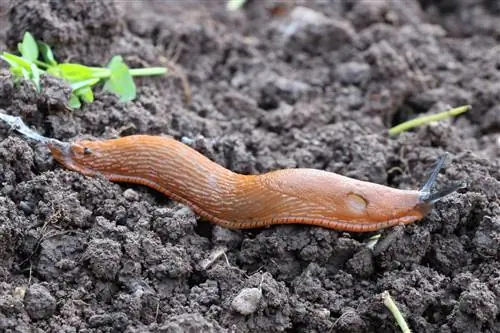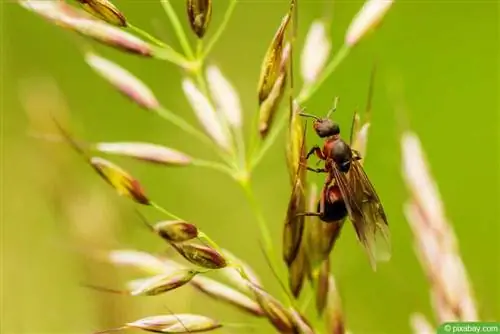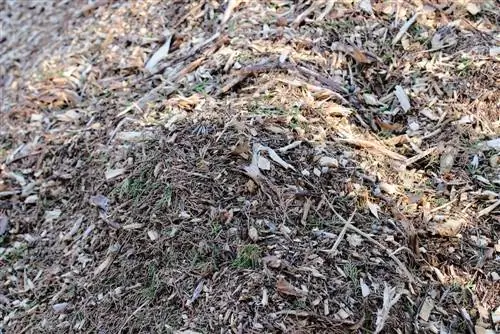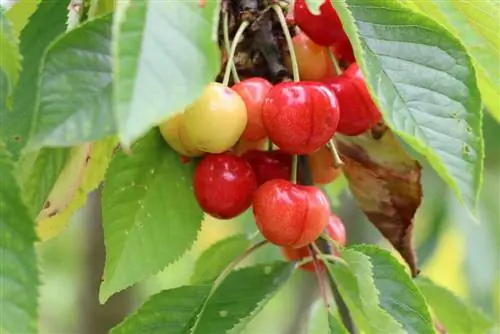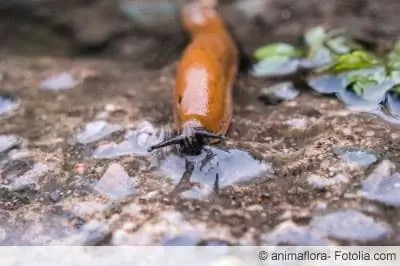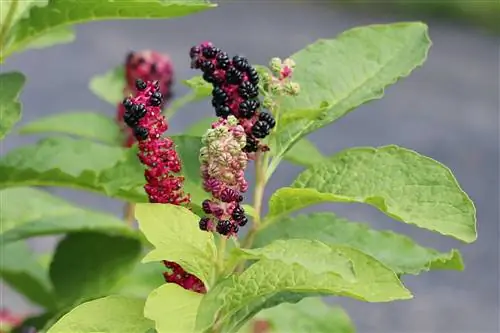- Author admin [email protected].
- Public 2023-12-17 03:39.
- Last modified 2025-01-24 12:45.
Slugs are a big test for every gardener. As soon as the first plants sprout, they are there and can be found everywhere. Slug pellets and other chemical agents are not a solution as they not only kill the slugs but also their natural enemies and can cause serious damage to the garden.
No endless fight against slugs
The slug deliberately chooses a garden. It becomes a nuisance, especially in wet summers, and rarely comes alone. A garden that is designed to be close to nature has a special attraction for the reptiles and allows them to arrive in large flocks. A single snail can produce up to 600 offspring over the course of a year, creating an unstoppable pest in the garden. Regular use is required here and you should check the conditions in the garden.
The right floor care to prevent snail infestation
When spring arrives, it brings the slugs with it. At this point it is already too late for prevention, so the gardener has to take action before the garden goes into hibernation and defend itself against slugs and their entry. There are various options here, of which floor care is one of the most important details. You don't see any snails and that's why you think there aren't any? You may be right, but when you think about this, forget about the slug's eggs, which are already in the ground, just waiting for spring to come and allow them to hatch in warmer temperatures. If you loosen the soil in autumn and are careful when covering it with bark mulch and do not overlook a nest of snails, you will not have to expect an armada of slugs in spring. The looser and more crumbly the soil is prepared, the greater the chance of destroying all clutches and being successful in prevention. If the gardener discovers a clutch of snails in the soil, he can remove it and then cover the soil with bark mulch.
Different ways to eliminate slugs
The most difficult and guaranteed time-consuming, but also most effective method against slugs is individual treatment. To do this, you should get up early, as slugs use the morning hours to search for food. They are only active all day on rainy days and can be collected from the plants and the soil. A morning visit to the garden declares war on the slug plague and means that most of the unwanted visitors in the garden can be caught, collected and removed from your property. The following options have proven effective against slugs and made the garden unattractive for the animals:
- the snail fence from the hardware store
- the beer trap as an effective classic
- individual care through collection
- attract animal predators of the snail (hedgehogs, birds, shrews, toads)
- Planting with aromatic herbs that is unattractive for slugs.
A hedgehog or shrew in the garden is a natural and efficient way to combat the slug population. Since snails are on the menu for these animals, a garden that is hedgehog-friendly and designed with nesting boxes to attract various types of birds is ideal. Runner ducks are only minimally suitable because, on the one hand, they like the snails, but on the other hand they also like the lettuce and therefore do not necessarily only consider the predatory pests as a food source. A barrier fence can help here to keep the ducks away from the beds. However, this means that in combination with running ducks, the snails on the plants should also be collected daily.
Slugs don't like all plants
It is best for the gardener to find out about the preferences of slugs and ensure that his beds are mixed. The slug's primary preferences include all forms of lettuce, but also some flowering plants and the fresh shoots of shrubs and perennials. Less popular and repugnant to the animal species are herbs and plants that cause aversion due to their strong scent and essential oils. For example, between the lettuce the gardener can:
- Dill
- Nasturtium
- Thyme
- Sage
- Peppermint
- Carnations
- or Columbine
plant and thus stop the slugs' urge to eat. An aromatic, fragrant bed is visited much less often than a salad bed, where the slug will help itself as if it were a buffet prepared especially for it. A combination of all measures is best. If the gardener loosens the soil in autumn and destroys existing nests with snail eggs, plants carefully and not to the taste of the slug and, on top of that, creates an animal-friendly garden that invites hedgehogs, birds and other predators of the snail, he will collect the Only discover a very small number of snails tomorrow and be successful in combating them without any chemicals.
A humane approach to the snail plague
As an angry gardener damaged by slugs, your first thought is to remove the eating pests from the bed. It is not uncommon for snails to be carelessly placed on the compost. This is not very efficient because slugs are cannibals and this practice attracts new snails. Any treatment with hot water, s alt or killing the animals should be avoided. If the gardener finds dead snails, he should bury them and thus prevent other species from becoming aware and being attracted to the dead snail. The snails that have been collected or discovered in the beer trap are best placed in a meadow that is some distance away from your own garden. In order not to annoy the neighborhood, you should not carelessly throw the animals over the fence and think that they will continue to eat at the neighbor's house and will no longer be interested in your own garden.
Conclusion: When there are numerous snail infestations, many gardeners feel like they are fighting windmills. Even if the number of slugs appears to be an almost insoluble problem at the beginning of biological removal, consistency and sustained effort will quickly lead to success. Anyone who attracts the snail's natural predators and offers them a nice place to live in the garden makes their work easier and receives effective and helpful support from nature.
What you need to know about remedies against slugs
- The daily collection is helpful, but extremely time-consuming and annoying, but in any case it also helps against egg laying!
- By the way, old boards offer a very good opportunity for collecting: the slugs collect underneath.
- Of course, the snails should not be released again in distant places!
- You can pour hot water or vinegar over them, for example, and then throw them away.
Many hobby gardeners swear by beer as a tried-and-tested home remedy: bury a cup half full of beer in the garden up to the edge of the container and, attracted by the scent of the beer, the snails fall in and drown. An unpleasant side effect, however, is that the scent of the liquid could attract more snails from neighboring gardens.
Of course, disposing of these cups is not a pleasant task afterwards, so it would be a good idea to prevent these pests from getting onto the beds in the first place:
- Copper wire is the solution. This can be stretched around the garden, just above the ground.
- The snails can't crawl under it, because copper is poisonous to the slugs because it oxidizes on their skin.
- Of course copper is completely harmless to vegetables, salads etc.
Slug pellets are also a commonly used snail control agent, but carry the risk of being harmful to other animals. If you want to avoid chemicals altogether, it's best to switch to plants (summer flowers, perennials and crops) that are snail-resistant.

